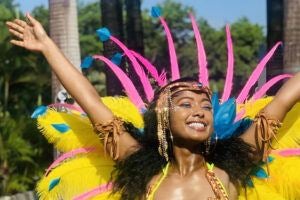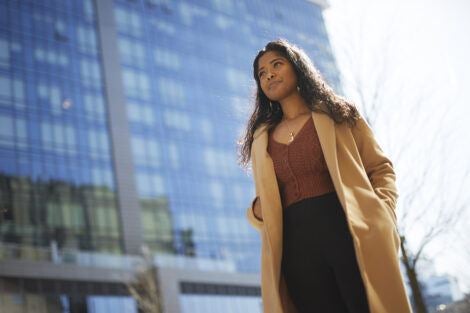March 19, 2021—Onisha Etkins uses social epidemiology—and dance—to share nuanced stories about Black and Brown people’s lives that center their joys and desires. In a recent interview, she spoke about how a desire to understand the ways systems of power shape health outcomes led her to Harvard T.H. Chan School of Public Health, and how she’s been using Caribbean dance to create virtual spaces for healing and joy during the pandemic.
I grew up in Canarsie, a neighborhood in Brooklyn, New York, with a big Caribbean diasporic community. The entire block was a family. In the summer, you’d have 15 or more kids coming together to play Double Dutch or hopscotch outside, and people just supported and looked out for each other. It was my first experience with what community care could look like.
When I was premed as an undergraduate at Stanford, I became frustrated by inequities I observed in clinical settings. That pushed me to start exploring the systems of power that shape health outcomes. Social epidemiology gave me that lens. When I was looking into PhD programs, I was really drawn to the research by faculty in the Department of Social and Behavioral Sciences, particularly David Williams. He became my advisor and really mentored me and shaped me into the critical thinker I hoped to become.
Being a public health student during the COVID-19 pandemic is overwhelming. We’re seeing a lot of what we’ve been learning in the classroom about health inequities play out in real time. For me, it’s very personal. We read about Black and Brown folks suffering, and those are literally my relatives and loved ones. I’ve found support in my friends here who are going through very similar experiences. We’ve had deep conversations about the pain people are feeling right now, but we try to also draw on the joys and the pleasures of our communities and look for what we can do to help.
My training as one of the first Pedagogy Fellows at the School equipped me with skills to teach my first solo course. I was invited to be a visiting instructor at Tufts Experimental College last fall, where I taught a course on a subject I’m passionate about—Dancehall Queens. Dancehall is a genre of Caribbean music, and the queens are incredible Black women who both sing and dance to the music and really show what reclaiming power and sexuality can look like. It was a primarily lecture-based course with two dance workshops. And then, last spring when the pandemic hit, a friend and I started hosting virtual workshops focused on dancehall and soca [short for “soul of Calypso”], another genre of Caribbean music. In addition to dancing, we’d have teach-ins about topics such as the history of those genres as they relate to liberation and resistance, as well as the exoticization of Black bodies in dance. It really took off and became a space of joy and healing for a lot people, as well as a way to bring the threads of my work on wellness and healing together.

Last year, I went to Carnival in Trinidad for the first time. One of my goals for my twenties was that I would go to a Carnival in a different place every year, and that would be my space for joy. The pandemic obviously canceled the season this year, so people are trying to embrace the pleasures of Carnival at home. A lot of the new soca music is about how Carnival is within us. For people who don’t know soca, I recommend starting with “Love It” by Kes. In terms of dancehall queens, I recommend Shenseea. All her music makes me feel empowered.
I think it’s important to address the joys, pleasures, and resiliency in Black and Brown communities, rather than solely focusing on the suffering and pain. My dissertation considers intersectional approaches for understanding the impacts of racism on mental health, including migration history and contact with the criminal legal system. One of the things I try to highlight is that Black folks aren’t homogeneous, and that our varied identities and experiences can play a role in our mental health and well-being. Right now, I’m also working with my friend and colleague Sherine Andreine Powerful, DrPH ’21, on organizing the Harvard Mahindra Humanities Center’s annual interdisciplinary graduate student conference, which will address how Black, Brown, and Indigenous communities are reimagining and reclaiming healing, pleasure, and restoration, particularly during times of crisis like the COVID-19 pandemic.
I have a clearer sense of what I want to feel and experience in the life I’ll lead after I graduate rather than the type of job I ultimately want to have. Whether I wind up in industry or academia, I want to have a sense of work-life balance. I want to be engaged and deeply involved with my community. I know that I want to have space to continue dancing and doing the work that I’ve been doing—and also to have space for rest.
Photos: Kent Dayton; Courtesy of Onisha Etkins
